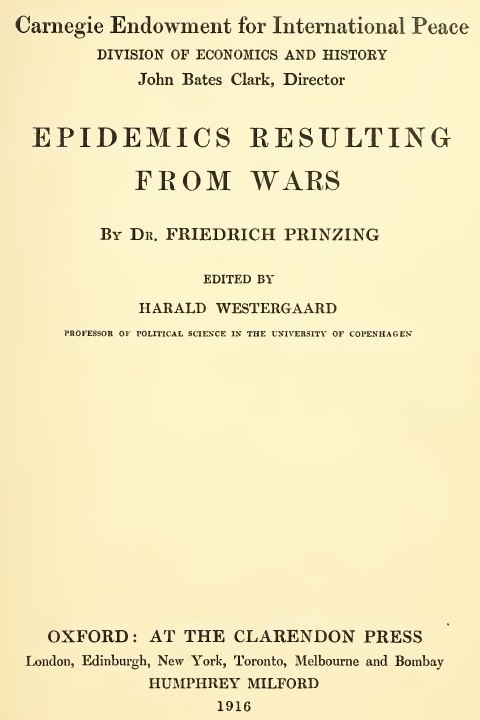A Lesson from History: Be Responsible and Get Vaccinated

This year I’ve been involved in a project, doing research on pandemics. As part of that, I’ve been reading this interesting old book I dug up. I like reading old books because the dated perspective and language is illuminating. It is like seeing into the past in a way that you won’t get from reading a history book written in current times.
The book is called “Epidemics Resulting From Wars“, by Dr. Friedrich Prinzing, a German doctor and pioneer in the field of medical statistics. It was published in 1916, under the auspices of the Carnegie Endowment for International Peace, stemming from a conference held in Berne, Switzerland, in August 1911. There is a sad irony in knowing that as this was being written, the Great Powers of Europe had already abandoned International Peace in favor of other ambitions.
In the introduction, the director of the Endowment’s Division of Economics and History has some hopeful comments about how, in the case of the Great War underway, advancements in medicine might mitigate the risk of disease that in the past always accompanied armed conflict. In that naïve and hopeful start-of-World-War-I way, he seems to believe that, thanks to modern science, at least that deadly facet of warfare can be eliminated. It is also a sad irony to read this knowing that an influenza pandemic, the second deadliest pandemic in human history, is just two years away from this book’s publication.
In this blog post, I wanted to highlight one part of the book. The eighth chapter is titled “The Franco-German War of 1870-1, and the Epidemic of Small-pox Caused by It.” In discussing this smallpox epidemic, time and again, the subject of vaccination comes up. As you probably know, the smallpox vaccine was the first vaccine developed, in the late 1700s. By the 1800s, German authorities were attempting to vaccinate their populations, but encountering resistance. Here are a couple of quotes from the book.
“In Württemberg, where vaccination had been compulsory since 1818, but had been frequently evaded in the ‘sixties in consequence of the agitation of the anti-vaccinationists, an epidemic of small-pox raged in the years 1863-7, causing, all told, 804 deaths.”
Dr. Friedrich Prinzing, “Epidemics Resulting from Wars,” p. 260
“The kingdom of Saxony experienced a very severe epidemic of small-pox in consequence of the Franco-German War. The wide dissemination of the disease is attributed by Wunderlich to the fact that vaccination, in consequence of the wild agitation of the anti-vaccinationists, was insufficiently practised; prior to the year 1874 vaccination was not compulsory in Saxony.”
Ibid., p. 269
I find it interesting that anti-vaxxers were around a century and a half ago. Their presence in society today is nothing new. And frankly, I can understand being wary of vaccination. I am actually wary myself. I don’t want someone injecting something into me if I can help it. But the point is that, under some conditions, you can’t avoid the need. The reason is there in the statistics – for example, as recorded in this book:
“A particularly good idea of the protection against small-pox afforded by vaccination is given in the Chemnitz statistics for the years 1870-1. Of 53,891 vaccinated persons 953 (1.8 per cent) contracted the disease in those two years and seven succumbed to it, all of whom were more than ten years of age ; of 5,712 unvaccinated persons, almost one-half contracted the disease (2,643 or 46.3 per cent, to be precise), and of these 243 (9.16 [per cent] of those taken sick) died.”
Ibid., p. 256
Simply put, a vaccinated population is less susceptible during a disease epidemic. Rates of infection and of mortality go down if vaccination is widespread.
So think about what that means for the current epidemic today. Maybe there is some risk to getting vaccinated. It could be inconvenient and uncomfortable since you might get sick for a day. We’ve even heard about potential problems with the J&J vaccine. And we’ve heard there’s a chance you could still catch COVID anyway.
But if a large portion of the population resists getting vaccinated, then there will be more sickness and more death. It’s unavoidable math. It’s the logic of a replicating virus.
Getting vaccinated isn’t really about protecting yourself. Vaccination is another measure to flatten the curve (flatten it way down), just like wearing masks and social distancing. You are asked to take a very small risk to prevent a great deal of suffering and death among other people in your society. That makes it a civic duty.